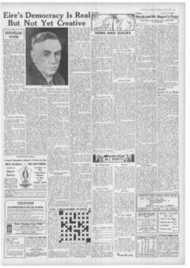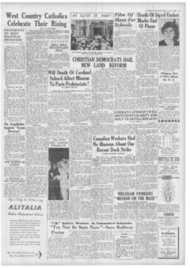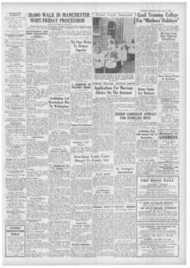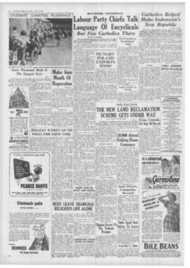Page 6, 17th June 1949
Page 6

Report an error
Noticed an error on this page?If you've noticed an error in this article please click here to report it.
Tags
Share
Related articles
The Woman Who Could Not Die
Letters Shining Spirituality
Smuggled Out Work Of Russia's Most Powerful Modern Writer
Spain Decorates Prison Director For His Enlightened Reforms
Irish Prisoners Plea
SPIRITUALITY IN PRISON
The WOMell Who Could Not Die. By fulia de Beausobre. (Gollancz, 12s. 6d.).
Reviewed by BARBARA WALL THIS book is about Russian
prisons and penal camps in the early thirties of this century, as seen by a cultured woman whose husband was suspectedwrongly—of treason against the regime. lulia de Beausobre starts her career of confinement in the Inner," the G.P.U. prison in Moscow, and finishes it after twenty months in a penal lumber camp. She is let out finally because she is so ill yet has not died (possibly, too, because her husband, Nicolay, whom she imagines to be in Siberia, has in point of fact been shot the previous January; anything to be got from her concerning him—even if there were anything to get—would now be too late.) Many ideas come from the reading of this beautifully-written book: the qualities of character that so often are uppermost in adversity and that make this account a tribute to, as well as an indictment of. human nature; the pitifulness of some of the jailors — "Some men are kind, others cruel. The cruel gloat on suffering, the kind are worried by another's pain and sorrow. Strangely enough, in this place which is one of the subtlest Palaces of Torture, most of the jailors are genuinely kind. Yet they must be staunch Communists, proved Stalinites, to be here at ail. They are certainly made to believe that we Prisoners are all self-interested haters -4 freedom and progress. Can human rzature be so near the divine after all, that even under such awful condi lions more kindness than cruelty flows front man to man ? Why this
abominable routine then ? This self imposed row of curses that torture my body and harrow ateir minds?" The studied mental torture is, however, more apparent in this ac count than physical torture—in the " Inner " the fact that, for all Julia de Beausobre knew, her husband was there, too; perhaps it was his
sneeze outside her door. And in the penal camp: " My bloated cardiac
peasants are dying slowly of broken
hearts, If they are still alive after having done their time, peasants are
sent to regions entirely strange to them, never back to their homes. rhey die because they cannot bear the knowledge that they will not see their own part of Russia again. They love their Damp Mother Earth, but
it has got to be the earth that bred
them, and Russia is so varied and so vast. They pray a lot, and dream
a lot, are naturally disciplined and quiet, but they take no interest in anything."
The spirituality of some of the victims, apart from the writer's own, shines like a beacon throughout the book. " I sit on the bed of Mother Theodosia, an old nun, who is dying slowly, irrevocably, of an illness that we call pellagra because it is least unlike it. The physical condition brought about by continuous under nourishment and protracted torturing of the soul has not been given a name by science yet. Her lace is like a tragic mask, her understanding and sympathy are limitless.
"'Pass away, my Angel 2'
I'I bow my head.
" Which one ?'
" Tamarah.'
May the Comforter lead her past the threshold of light. . . Even
if Nicolay should go too, you must always remember this is the year of Our Lord nineteen thirty-three !
Those of us who die in Him now join Him at once. There is no pain for us, only rejoicing.. Rebuild your heart into an eternal tabernacle for thanksgiving.'
" `Yes, Mother.'" When Julia de Beausobre is finally liberated, she has an unavailing strug gle to establish her legal existence, to get a card to enable her to work to enable her to eat. She starts queueing at midnight outside the police station. When the official sees her liberation paper he.says he won't have her in his town, which is full of undesirables as it is: she must leave within twenty-four hours or be sent back to the woods.
Finally, through an old English governess, she is able to come to this country. " Is it really 1 who
am walking in the scented Sussex lane T. . . The ground rises. There is no undergrowth beneath the beeches. In their shade we climb to Chanctonbury Ring."
This book. while being a record of Russian methods and of much cruelty and suffering. is also'a record of a very remarkable woman who practised Christian charity and for giveness to an heroic degree in horri fying circumstances. and who, If she had been allowed to live as a normal citizen, would. as Rebecca West points out in her introduction, have done much to help her country.
Mrs. Arthur Strong: A Memoir, by Gladys Scott Thomson. (Cohen `and West, 7s. 6d.)
Anybody who lived in Rome during the interbellum period has heard of Mrs. Strong and a short biography of her is timely and wel come. She was one of the first Englishwomen to make a career for herself in pure scholarship, choosing classical art and archaeology as her
life work. In 1909 she was appointed Assistant Director of the British School in Rome and for thirty years she held a unique place in the social and intellectual life of that city. "The Challenge," by Fr, Andrew Gordon, S.J., is priced at 5s. (in boards, 7s. 6d.) and not 2s. 6d. as stated in a recent review in these columns. Publishers are the Catholic Social
blog comments powered by Disqus









